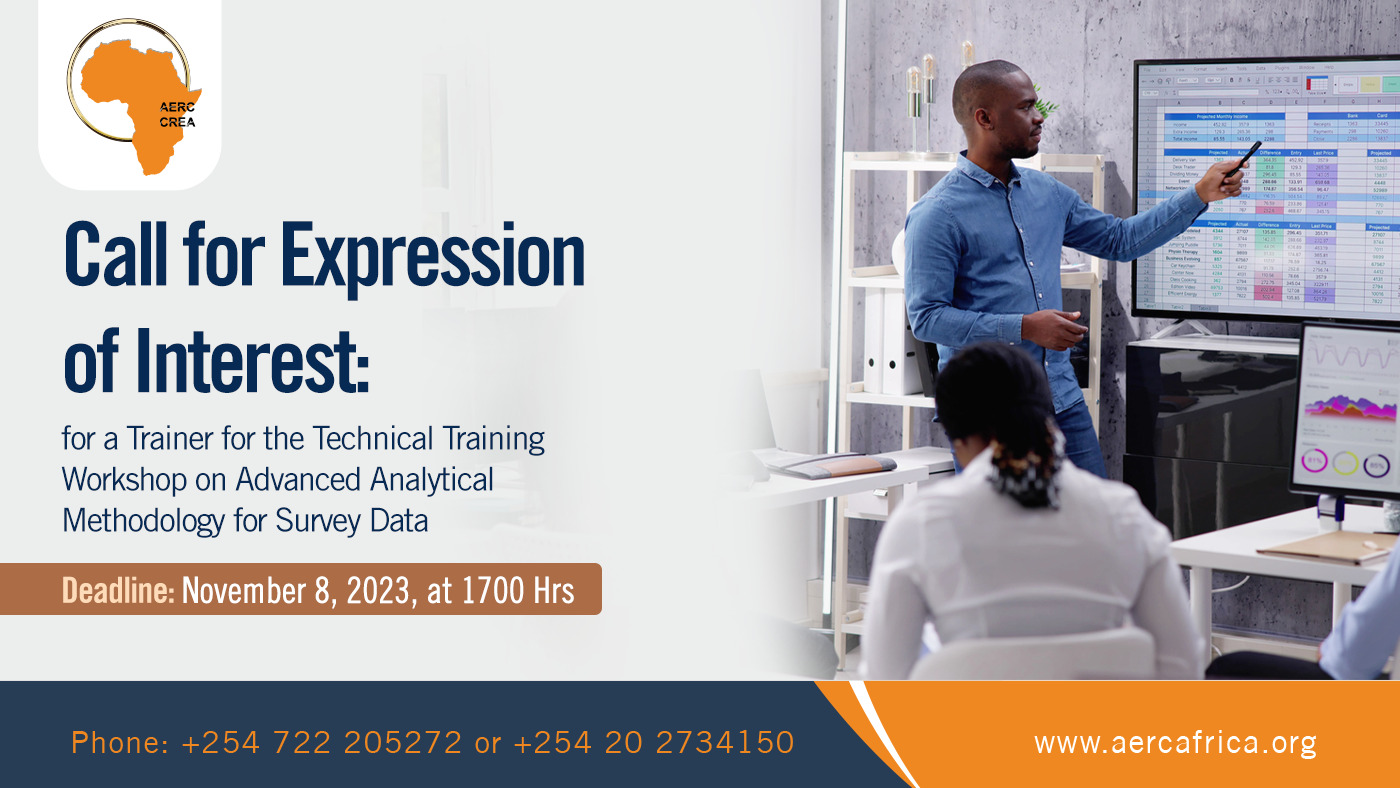
AERC- World Bank Kenya Analytical Programme on Forced Displacement (World Bank KAP-FD) Thematic Project
Call for Expression of Interest for a Trainer for the Technical Training Workshop on Advanced Analytical Methodology for Survey Data
Introduction
The World Bank Group works to fight poverty across the globe, using the latest evidence and analyses to inform government policies to reduce inequalities and improve people’s lives. In Kenya, the World Bank and United Nations High Commissioner for Refugees (UNHCR), in collaboration with the Kenya National Bureau of Statistics (KNBS), have worked together to better understand the living conditions of refugees and host communities, providing important evidence and lessons to better inform measures that improve their socioeconomic opportunities. Building upon the fruitful outcomes of these precedingprojects, the World Bank intends to gather more granular evidence under the Kenya Analytical Program on Forced Displacement (KAP-FD). KAP-FD seeks to, among other things, build the capacity of early-career researchers in the country to use displacement data. The capacity of local academics will be built by facilitating and financing research projects utilizing the data produced under KAP-FD and/or previous projects. By encouraging and financing projects of local researchers, capacity for displacement related research will be enhanced, while ensuring the wide use of data collected in World Bank supported surveys.
The African Economic Research Consortium (AERC) established in 1988, is one of the most active Research and Capacity Building Institutions (RCBIs) in the world, with a focus on Africa. The Consortium’s mission is to strengthen local capacity for conducting independent, rigorous inquiry into the problems facing the management of economies in sub-Saharan Africa. The mission and objectives of the AERC are achieved through a long-standing collaborative and networking framework of its research and training programmes, supported by an interactive communications and outreach programme and backed by a comprehensive management and administration component. The AERC’s mission rest on two premises: first, that development is core likely to occur where there is sustained and sound management of the economy; second, that such management is more likely to happen where there is an active, well-informed cohort of locally based professional economists to conduct policy-relevant research. This capacity building directly supplies economic policy analysts to the public sector and think tanks in SSA.
Since 1988, AERC has provided capacity building to over 4,500 early and middle career researchers in Sub-Saharan Africa through the Thematic Research Program. The theme on forced displacement is aligned to AERC Strategic Plan 2020-2025 which has a focus on inclusivity of those underrepresented in Sub-Saharan Africa’s development agenda and research. The Thematic Research Program provides a platform for expert mentorship and peer review of early career researchers' work. The model for implementing the AERC-World Bank Thematic Research on Forced Development is premised on thematic research program structure which will run concurrently with Biannual Research Workshops held twice in a year in June and December. In this model, capacity building is realized where researchers attend presentation sessions and are mentored by expert resource persons and get feedback from their peers.
AERC is implementing the World Bank thematic research project on Kenya Analytical Programme on Forced Displacement (KAP-FD) funded by World Bank. The project objectives are to: (i) systematically collect and analyzes socioeconomic panel data of refugees and hosts, with a focus on livelihoods and mental health; and (ii) builds capacity to generate, share and use displacement data across different stakeholders. The expected output of the project is the production of five (6) high-quality policy-focused papers on forced displacement-related issues that are driven by evidence and have clear policy messages to inform the policy debate in Kenya. The project is implemented under the premise of thematic research programme, that involves mentorship from global experts in research and it is all about learning by doing. Six studies on Forced Displacement are being undertaken by early career researchers, using survey data from a selected data set. The data sets include: the Socioeconomic Surveys (SESs), the Kenya Continuous Household Survey on Refugees and Host Communities (KCHS Integrated Survey), and the Kenya COVID-19 Rapid Response Phone Survey (RRPS) produced broad socioeconomic data on host communities and forcibly displaced in Kenya.
Aim of the Workshop
AERC has organized for a Technical Training Workshop on ‘Advanced Analytical Methodology for Survey Data’ to be held from December 1 – 6, 2023 in Nairobi, Kenya.The goal of the advanced survey data methodology training workshop is to impart advanced survey data analytical skills to the researchers. Specifically, the workshop is intended to: build capacity of the researchers on advanced analytical methods for cross sectional data; develop the researchers’ skills on advanced analytical methods on pooled and longitudinal data; and build competency of the researchers use statistical computer packages for survey data analysis; build ability of the researchers to use and conduct robust estimation of the World KAP-FD data sets.
This course is tailor-made for World Bank KAP-FD thematic researchers who are based in Kenya. The technical training workshop will cover the following topics in advanced analytical survey data methods. The workshop is intended to cover areas not limited to the following topics:
(a) Nature and preparation of cross-sectional and pooled survey data.
(b) Advanced methods of cross-sectional survey data analysis.
(c) Advanced method of pooled survey data analysis,
(d) Practical application of STATA on survey data.
(e) Case studies involving use of cross-sectional and pooled survey data.
References
(a) Wooldridge, J.M. (2010). Econometric Analysis of Cross Section and Panel Data
The MIT Press: Massachusetts.Latest Edition.
(b) Cameron, A.C. and Trivedi, P.K (2005). Microeconometrics: Methods and
Applications. Cambridge University Press: New York. Latest Edition.
(c) Palgrave Handbook of Econometrics: Applied Econometrics Vol 2, edited by Terence C. Mills and Kerry Patterson, 2009
d) Journals Articles that have applied cross-sectional and pooled survey data
estimation.

